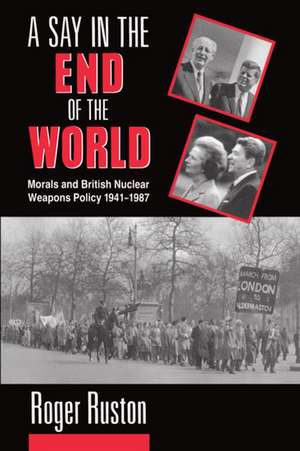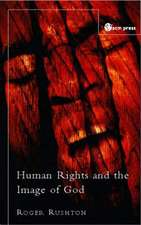A Say in the End of the World: Morals and British Nuclear Weapons Policy 1941-1987
Autor Roger Rustonen Limba Engleză Hardback – 10 aug 1989
Preț: 272.01 lei
Preț vechi: 466.90 lei
-42% Nou
Puncte Express: 408
Preț estimativ în valută:
52.05€ • 54.48$ • 43.32£
52.05€ • 54.48$ • 43.32£
Carte tipărită la comandă
Livrare economică 20-26 martie
Preluare comenzi: 021 569.72.76
Specificații
ISBN-13: 9780198275657
ISBN-10: 019827565X
Pagini: 282
Ilustrații: bibliography
Dimensiuni: 146 x 224 x 22 mm
Greutate: 0.5 kg
Editura: Clarendon Press
Colecția Clarendon Press
Locul publicării:Oxford, United Kingdom
ISBN-10: 019827565X
Pagini: 282
Ilustrații: bibliography
Dimensiuni: 146 x 224 x 22 mm
Greutate: 0.5 kg
Editura: Clarendon Press
Colecția Clarendon Press
Locul publicării:Oxford, United Kingdom
Cuprins
Introduction; PART I: JUST WAR AND ITS ENEMIES: Should war be humanized?; Weapons, targets, and the law; New uses for an old theory; The rules of just war; Non-combatant immunity and its critics; LESSONS OF THE PAST 1: APPEASEMENT: The lesson and its teachers; Arms and security; Appeasement or Armegeddon?; The anti-Soviet element; LESSONS OF THE PAST 2: STRATEGIC BOMBING: From 1917 to 1939: The theory; The moral background; From 1939 to 1945: The practice; The official version; Reprisals in ethics and law; conclusions; PART II: WEAPON FOR A FIRST CLASS NATION, 1941-1952: The decisive weapon; The bomb is made and used; Labour inherits the bomb; Strategic priorities; The importance of the Soviet threat - and the American presence; The British bomb becomes a reality; The silence of the moralists; JOINING THE 'H-CLUB', 1953-1956: The year of the H-bomb; Massive retaliation and tactical nuclear weapons in Europe; Nuclear revisionism: graduated deterrence; conclusions; DETERRENCE ON THE CHEAP, 1957-1964: The new defence policy of 1957; Deterrence or defence?; A say in the end of the world: Britain's independent contribution; Macmillan and the test ban; The question of strategy; The symbolic value of possession; Labour and unilateralism; Unacceptable damage: How Polaris would be used; Moral critique, 1957-1964; conclusions; POLARIS AND DETENTE, 1965-1976: The changing outlook on defence; Flexible response; Detente and 'The continuing threat'; American actions - British responsibilities; Would Polaris always get through?; conclusions; CRISIS OVER MODERNIZATION, 1977-1987: The new insecurity; Long range theatre nuclear weapons; Replacing Polaris; The INF agreement; The new nuclear debate; conclusions; PART III: THE ETHICS OF FLEXIBLE RESPONSE: Preventing war; The question of limits; Two kinds of deterrence; The limit of limits; The control of nuclear war; conclusions; CONCLUSIONS.
Recenzii
'an absorbing account of British nuclear weapons policy ... All those concerned about nuclear weapons will benefit enormously from reading this book.' Labour Research
'it is rare that a thesis so tightly argued should be so very readable ... a truly excellent book'Owen Hardwicke, Sanity
'It is clearly, concisely and cogently written and is the only book which analyses the course of the British nuclear debate through the forty-six year period.'Month
'The book has been carefully researched.'Day by Day
'it is rare that a thesis so tightly argued should be so very readable ... a truly excellent book'Owen Hardwicke, Sanity
'It is clearly, concisely and cogently written and is the only book which analyses the course of the British nuclear debate through the forty-six year period.'Month
'The book has been carefully researched.'Day by Day
Notă biografică
former Lecturer in Ethics and Moral Theology at Blackfriars, Oxford.












